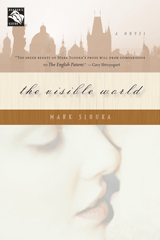Reading Guide Questions

Please be aware that this discussion guide will contain spoilers!
- The Visible World is divided into three sections—"The New
World: A Memoir," "Prague: Intermezzo," and "1942: A Novel"—each of
which represents a different approach to the same essential story. Which
section, do you think, is most "true"? Why? How do the three sections
play off of each other to create a complex whole?
- The first section begins with the narrator stating, "I was born ...
into a world that felt just slightly haunted." What haunts his family,
his community? How do the ghosts of the past shape the course of the
narrator's life?
- The narrator says of his childhood: "I collected the facts like a
child hoping to build an oak from bits of bark." Do you believe that the
narrator is ultimately able to reassemble a version of history that
closely resembles the true events? How so or how not? Why does he try so
earnestly to piece together the story?
- How would you characterize the relationship between the narrator's
parents, Antonín and Ivana, as portrayed in "The New World: A Memoir"?
How does the story told in the third section change or support the way
you perceive their marriage? Do you think you would have made the same
choices they did? How so or how not? Who is the more sympathetic
character?
- In the New York Times Book Review, Eva Hoffman praised
Slouka's investigation of "the uncertainties of cross-generational
memory and the need to fill in the gaps." What compels us to construct
stories out of our own histories? How does The Visible World
illustrate this need? How have you made stories from your own personal
or family history?
- How does The Visible World investigate the profound impact
of secrecy, of information withheld, in love and in war? How are the
lives of its characters shaped by what is known and what is unknown?
- The narrator describes the book's central relationship this way:
"Theirs was a love story, and like any good love story, it left blood on
the floor and wreckage in its wake." Who suffered most as a result of
their love? Who lost the most? Would you describe theirs as a "good love
story"? Why or why not?
- Fairy tales and literature figure prominently in the narrator's
young life. How do these early stories resonate in his adult life?
- When streets in Prague's Old Town were inundated by floodwaters,
first floors became cellars. In what way does this physical world buried
beneath the present world work as metaphor? How can this idea of a
hidden past be applied to storytelling, to truth, to the way history is
recorded? How does it relate to the novel's title, The Visible
World?
- Each of the characters encountered in the second section, "Prague:
Intermezzo," offers a different memory of life in prewar and wartime
Europe. How do you suppose the passage of time has altered these
memories? How does the narrator apply the information he gathers in
Prague to his reimagining of his parents' story?
- The narrator recalls: "I asked my father if he had ever been a hero.
He said no, not even close to one, and because he was my father, I
believed him." How might Antonín be regarded as a hero, in the ‘memoir'
and in the ‘novel'? Why would he not have considered himself heroic? Do
you think his son comes to regard him as such?
- What factors initially draw Tomáš and Ivana together? Do you believe
the relationship would have lasted if it were not for the events of war?
Why or why not? Do you agree with Antonín, who prays that Tomáš will
live through the war so that habit can do its work and his and Ivana's
love can "die on the field of days"?
- Tomáš and Ivana's love affair takes place in a setting seemingly far
removed from the bleak realities of wartime. What does the near-mythical
forest represent in the context of the novel? Why might the narrator
have imagined the story this way? How does the lovers' last meeting in
Prague contrast with their time in the forest?
- Antonín's friend Mirek suggests that Ivana will return to him when
she grows tired of Tomáš. Antonín's reply is maybe, "and because he
loved her as much as he did, he almost wished it could be otherwise."
How did you interpret this almost-wish? What does it reveal about
Antonín's love for Ivana, his regard for himself?
- The epigraph of The Visible World is taken from the poem
"As I Walked Out One Evening" by W.H. Auden. How do Auden's lines
resonate in Slouka's novel?
- The novel opens and ends with the same scene, that of Antonín
getting dressed in the dark to go out and search for Ivana, who had gone
for a walk in the forest at night. How does the context provided by the
novel change how you perceive this scene? What emotions does it stir
with each telling?
Unless otherwise stated, this discussion guide is reprinted with the permission of Mariner Books.
Any page references refer to a USA edition of the book, usually the trade paperback version, and may vary in other editions.

 Book Reviewed by:
Book Reviewed by:





